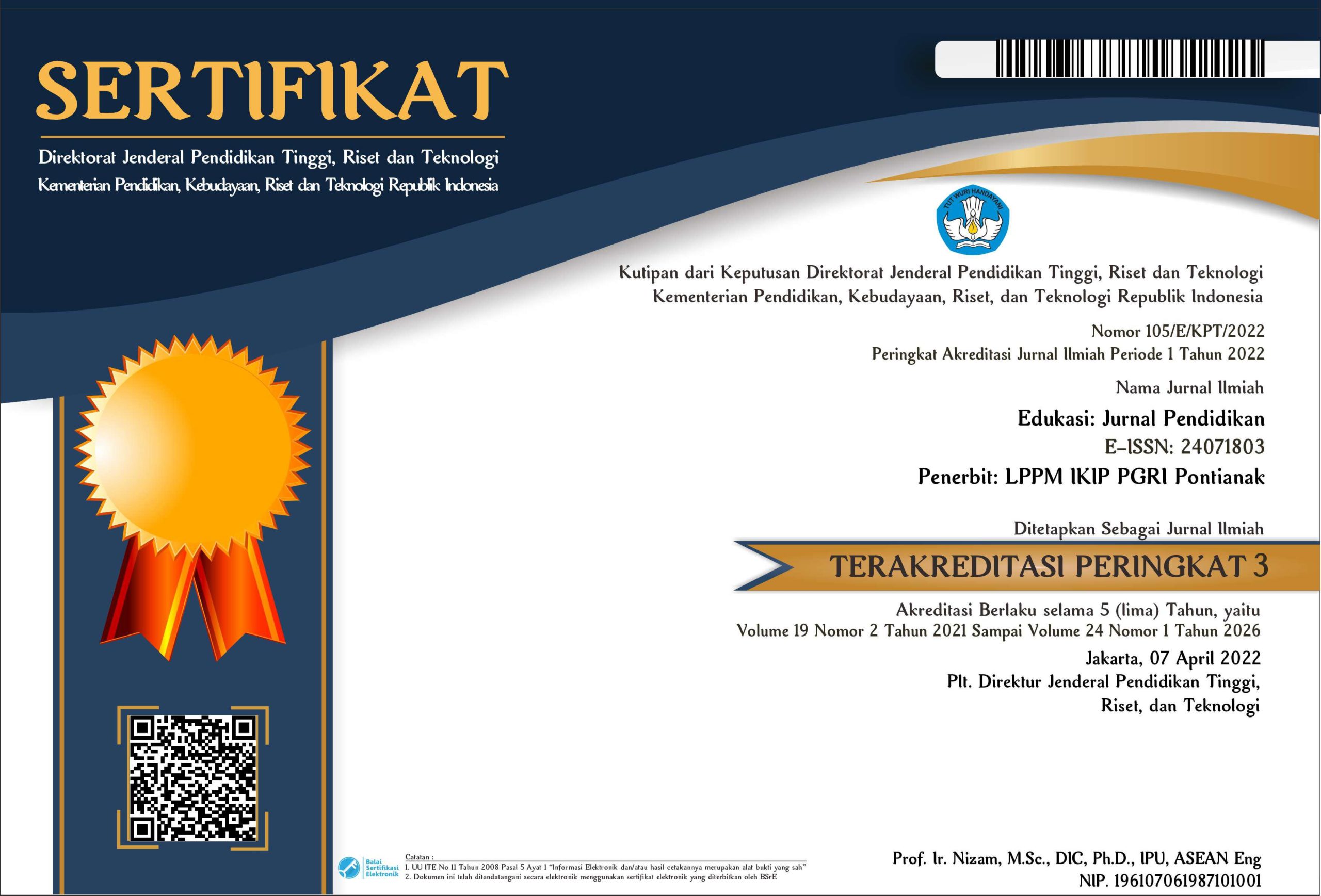Kemampuan Awal Kalkulus Mahasiswa Pendidikan Matematika
DOI:
https://doi.org/10.31571/edukasi.v18i1.1679Keywords:
kemampuan awal, tingkat kemampuan awal, strategi pembelajaran, prior knowledge, grade of prior knowledge, learning strategyAbstract
Abstrak
Penelitian bertujuan untuk mendeskripsikan tingkat kemampuan awal Kalkulus mahasiswa Pendidikan Matematika FKIP Universitas Bung Hatta tahun pertama. Metode penelitian menggunakan metode deskriptif. Subjek penelitian adalah mahasiswa yang mengambil mata kuliah Kalkulus Diferensial pada semester kedua. Instrumen penelitian menggunakan tes diagnostic yang dikembangkan oleh Stewart dengan materi aljabar, Geometri, Trigonometri, dan Fungsi serta wawancara terhadap peserta. Tenik analisis data menggunakan analisis dekriptif. Berdasarkan hasil penelitian, terlihat bahwa kemampuan awal mahasiswa berada pada tingkat sangat rendah, yaitu 8,6%. Hasil wawancara terhadap 6 orang mahasiswa yang mempunyai kemampuan skor tinggi, sedang, dan rendah menyatakan bahwa mahasiswa memerlukan tambahan pengetahuan tentang konsep bilangan serta sifat-sifatnya, operasi aljabar, visualisasi dengan teknologi serta konsep fungsi. Berdasarkan hasil tersebut, diperlukan strategi pembelajaran pada mata kuliah Kalkulus yang berbasis teknologi untuk memberi pemahaman konsep Kalkulus.
Â
Abstract
The research aimed to describe the initial ability level of Mathematics Education in the first year of the Mathematics Education Faculty of Bung Hatta University. The research method used descriptive. The research subjects were students who took Differential Calculus courses in the second semester. The research instrument used diagnostic tests developed by Stewart with algebraic material, Geometry, Trigonometry, and Functions as well as interviews with participants. Data analysis techniques used descriptive analysis. Based on the results of the research, it appeared that the initial ability of students is at a very low level, which is 8.6%. The results of interviews with 6 students who have the ability to score high, medium, and low stated that students need additional knowledge about the concept of numbers and their properties, algebraic operations, visualization with technology and the concept of functions. Based on these results, a learning strategy for technology-based Calculus is needed to provide an understanding of the Calculus concept.
Downloads
References
Amalia, R. 2016. Kemampuan Berpikir Matematis Mahasiswa dalam Menyelesaikan Masalah Geometri. Jurnal Pendidikan Matematika, 4(2): 118–125.
Aminah, M., Kusumah, Y. S., Suryadi, D., & Sumarmo, U. 2018. The Effect of Metacognitive Teaching and Mathematical Prior Knowledge on Mathematical Logical Thinking Ability and Self-Regulated Learning. International Journal of Instruction, 11(3): 45–62.
Ario, M. 2019. Profil Kemampuan Awal Matematis Mahasiswa Pendidikan Matematika. Jurnal Absis: Jurnal Pendidikan Matematika dan Matematika, 1(2): 72–77.
Burhanuddin. 2013. Penerapan Kalkulus Integral pada Bidang Biologi. Jurnal Biology Education, 2(1): 8–13.
Desfitri, R. 2016. In-Service Teachers’ Understanding on the Concept of Limits and Derivatives and the Way They Deliver the Concepts to Their High School Students. Journal of Physics: Conference Series, 693: 1–9.
Firmansyah, M. A. 2017. Peran Kemapuan Awal Matematika dan Belief Matematika terhadap Hasil Belajar. Prima: Jurnal Pendidikan Matematika, 1(1): 55–68.
Hartati, L. 2019. Analisis Kemampuan Pemahaman Matematis Mahasiswa pada Mata Kuliah Kalkulus Berdasarkan Teori APOS. Prosiding Seminar Nasional Pendidikan KALUNI, 2(2019): 174–183.
Hevriansyah, P. & Megawanti, P. 2017. Pengaruh Kemampuan Awal terhadap Hasil Belajar Matematika. JKPM (Jurnal Kajian Pendidikan Matematika), 2(1): 37-47.
Kartono. 2003. Aplikasi Matematika dalam Perencanaan dan Pengendalian di Bidang Industri. Jurnal Matematika dan Komputer, 6(1): 49–58.
Khairudin, Suryani, K., Fauzan, A., & Armiati. 2020. Self Regulated Learning of Mathematics Education Students of Bung Hatta University. Journal of Physics: Conference Series, 1429 (2020): 1–8.
Ladachart, L. 2019. Thai Science Educators’ Perspectives on Students’ Prior Knowledge: A Documentary Research. Science Education International, 30(2): 116–127.
Larson, R. 2009. Calculus: An Applied Approach (Eighth Edi; C. L. Brooks/Cole, ed.). USA: Brooks/Cole, Cengage Learning.
Lestari, W. 2017. Pengaruh Kemampuan Awal Matematika dan Motivasi Belajar terhadap Hasil Belajar Matematika. Jurnal Analis, 3(1): 76–84.
Moru, E. K., Qhobela, M., Wetsi, P., & Nchejane, J. 2014. Teacher Knowledge of Error Analysis in Differential Calculus. Pythagoras, 35(2): 1–10.
Sabirin, M., Fitria, A., & Ningsih, S. 2017. Profil Kemampuan Matematika Dasar Mahasiswa Program Studi Pendidikan Matematika Tahun Akademik 2013/2014. Jurnal Pendidikan Matematika, 2(2): 29–42.
Samo, D. D. 2017. Kemampuan Pemecahan Masalah Mahasiswa Tahun Pertama pada Masalah Geometri Konteks Budaya. Jurnal Riset Pendidikan Matematika, 4(2): 141–152.
Sofronas, K. S., DeFranco, T. C., Vinsonhaler, C., Gorgievski, N., Schroeder, L., & Hamelin, C. 2011. What Does It Mean for A Student to Understand the First-Year Calculus? Perspectives of 24 Experts. Journal of Mathematical Behavior, 30(2): 131–148.
Stewart, J. 2010. Single Variable Calculus: Concepts and Contexts, (4 edition). USA: Brooks/Cole.
Downloads
Published
How to Cite
Issue
Section
License
Authors who publish in this journal agree to the following terms:
- Authors retain copyright and grant the journal the right of first publication with the work simultaneously licensed under a Creative Commons Attribution License (CC-BY-NC) that allows others to share the work with an acknowledgment of the work's authorship and initial publication in this journal.
- Authors are able to enter into separate, additional contractual arrangements for the non-exclusive distribution of the journal's published version of the work (e.g., post it to an institutional repository or publish it in a book), with an acknowledgment of its initial publication in this journal.
- Authors are permitted and encouraged to post their work online (e.g., in institutional repositories or on their website) prior to and during the submission process, as it can lead to productive exchanges, as well as earlier and greater citation of published work.

 Download: 391
Download: 391


















